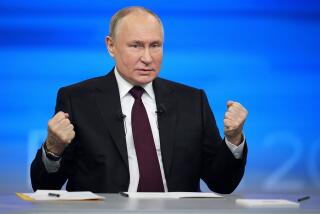Yeltsin Pledges to Seek Peace With Gorbachev
MOSCOW — Boris N. Yeltsin, the new president of the Russian Federation and a leading critic of Mikhail S. Gorbachev, said Thursday that he will try to make peace in his personal feud with the Soviet president.
Yeltsin, a radical reformer, was quoted by the official Tass news agency as saying that he will put aside personal differences with Gorbachev when the president returns from the Washington summit.
Yeltsin was seeking to calm the fears of the deputies of the republic’s Congress about his stormy relationship with Gorbachev, his former mentor.
In his new position as president of Russia, the largest Soviet republic, Yeltsin has a formidable platform from which to challenge and criticize Gorbachev, who opposed his election.
Deputies speaking Thursday at the Russian Congress “expressed concern over the exchange of statements about each other” by Yeltsin and Gorbachev, Tass reported.
Yeltsin answered that after Gorbachev returns June 4 from the summit in Washington, “I think we’ll have an appropriate conversation, and we’ll resolve most issues without damaging the sovereignty and aims of Russia,” Tass said.
At a news conference Wednesday, Yeltsin called for achieving Russian “sovereignty” within 100 days. The term is used here to mean not independence, but autonomy in most internal decisions.
Yeltsin also urged the Kremlin to allow the other 14 republics to enjoy the same autonomy, making the country a federation of states that could overrule the central government on most matters.
Although Yeltsin said he wanted a “businesslike” relationship with Gorbachev, he also made an oblique call Thursday for Gorbachev to give up one of his posts: either Soviet president or Communist Party general secretary.
“I am against combining any post in one person,” he said.
In Ottawa on Tuesday, Gorbachev said he was “somewhat concerned” about Yeltsin’s victory and feared that if Yeltsin “is playing a political game, then we may be in for a difficult time.”
At Thursday’s session of the Russian Congress, Deputy Ivan Galushko from the Jewish Autonomous Region in the Soviet Far East said Yeltsin was overstepping his authority in some of the statements he made the day before.
He called on Yeltsin “to refrain from hasty statements on questions that are within the competence of the Congress or Supreme Soviet.” Tass said that many deputies seconded Galushko’s opinion.
More to Read
Sign up for Essential California
The most important California stories and recommendations in your inbox every morning.
You may occasionally receive promotional content from the Los Angeles Times.










